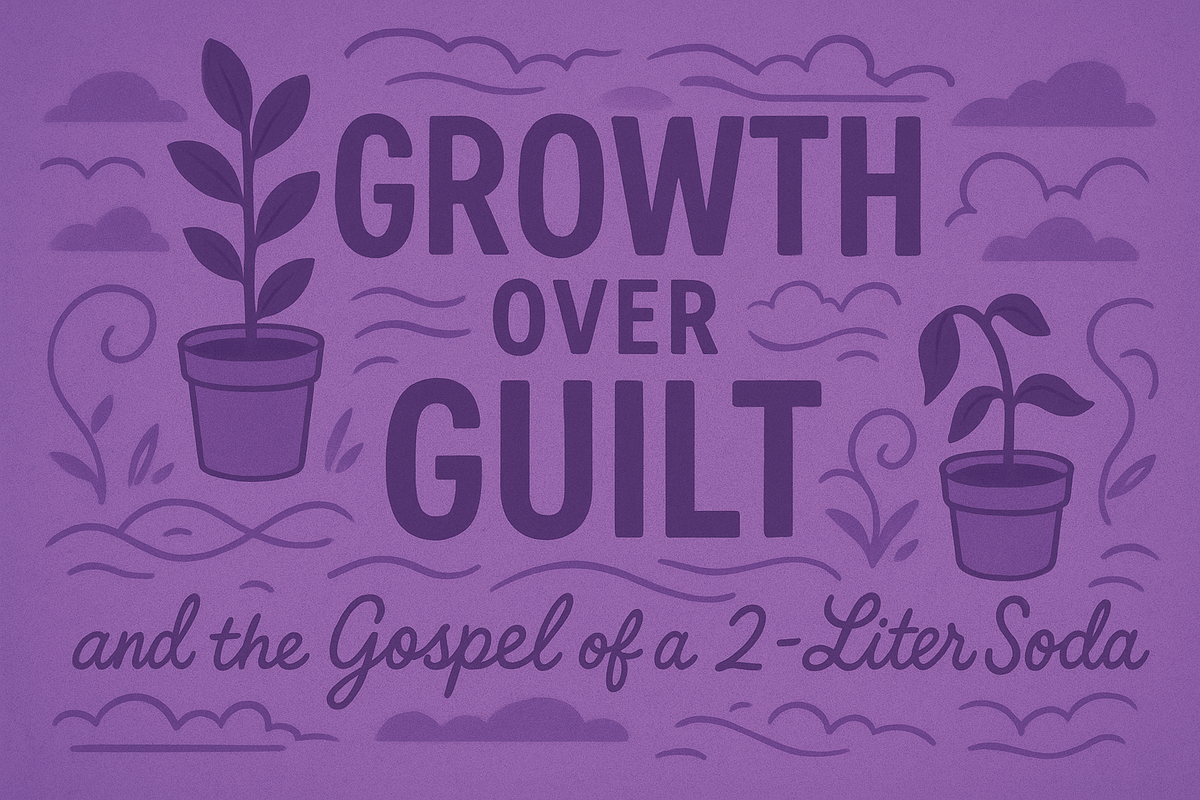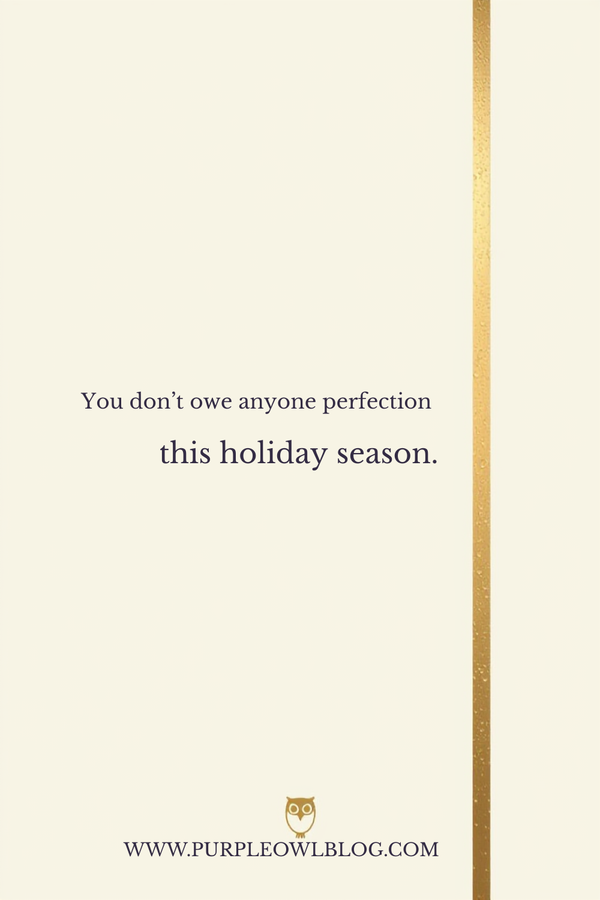Growth over Guilt and the Gospel of a 2-Liter Soda

The Encounter
I was standing in line at Family Dollar—because yes, I’m also ballin’ on a budget, so let’s not pretend I’m above anything—when a family in front of me caught my attention. They looked rough. Clothes dirty. Hair wild. Teeth mostly MIA. There was a baby in the cart and at least two adults, maybe three depending on who was parenting and who was just there for the ride. Right after the woman paid, she cracked open a 2-liter of orange soda and took a swig right there at the checkout like she’d been stranded in the desert. And I’ll be honest: my first reaction wasn’t kind. It wasn’t compassionate. It was judgmental. I felt my mother rise up in my throat—this knee-jerk reaction that said, “We don’t act like that in public. Be decent. Be presentable. Be better.” I caught myself feeling all this pressure around what people “should” look like to be accepted. And then I remembered—who the hell am I to judge someone else’s thirst? This moment made me reflect on the concept of growth over guilt, as I realized that everyone has their own story.
As we navigate our choices, it’s essential to embrace the idea of growth over guilt, allowing ourselves to learn from our experiences without the weight of judgment.
The Judgment + Inner Conflict
As soon as the judgmental thought hit me, I felt gross. Like, deeply uncomfortable in my own skin. Because the truth is—I’ve done some desperate sh*t too. I’ve eaten snacks before I paid. I’ve been dirty in public, not because I wanted to be, but because life was just lifeing too damn hard that day. And here I was, standing in my own version of broke, judging someone else’s. The audacity. What really got me, though, was realizing the woman brought the soda up as a last-minute item—like they were counting the cost of everything as they checked out, making sure they could afford it all. That drink might’ve been a luxury. A small treat. And she cracked it open like it was a victory toast after making the math work. And what did I do? I judged her. Again. Jerk moment, table for one.
I felt like a hypocrite, but more than that—I felt like I was holding onto this mold of how “decent people” should behave, and punishing others for not fitting it. Society teaches us to perform respectability in exchange for dignity, and I’ve bought into that. Hard. But deep down, I’m just as thirsty—metaphorically and literally. So why did I feel so disgusted by that woman doing what any of us might do after barely scraping enough change together for a soda? Damn. I didn’t like what that said about me.
The Guilt I Carried
That moment cracked something open in me, and I couldn’t stop thinking about my own story—the choices I’ve made, the chaos I’ve walked through, and the guilt I’ve practically gift-wrapped and carried with me like it was some moral compass. I didn’t get to where I am by luck or clean, easy living. I’ve made decisions I’m not proud of. I’ve chased things that looked shiny from a distance but ended up cutting me on the way down. And through it all, I kept this running mental list of every mistake I’d ever made—like if I kept remembering who I used to be, I wouldn’t become her again. Guilt was my weird little security blanket. Not warm or helpful—but familiar. I thought if I held onto it tight enough, it would keep me from slipping back. That somehow, constant shame would equal growth. Spoiler alert: it doesn’t.
The Pattern I Couldn’t Break
I didn’t want to carry that guilt, but I also didn’t know how to put it down. So instead, I let it guide me in this backwards way—like maybe if I punished myself enough, I could make it right. I was always chasing the next “better” thing. A better job. A better living situation. A better relationship. But underneath all of it, what I was really chasing was the idea of an easier life. One that wouldn’t make me feel so behind. One that wouldn’t make me feel so less than. And because I couldn’t sit with discomfort, I kept moving—physically, emotionally, mentally. I cycled through roommates, crashed in other people’s houses, bounced from one unstable setup to the next. I didn’t have consistency, and that meant my kids didn’t either. My oldest lived through more chaos than she ever should’ve had to. And while I know I was doing my best with what I had, I still carry the sting of knowing that “my best” didn’t include stability until she was nearly grown. That’s where the guilt comes from. That’s what I’ve been dragging around for years.
Letting Go of the Guilt + Breaking the “Shoulds”
But something’s changed in me. Maybe it’s age, maybe it’s therapy, or maybe it’s just plain exhaustion—but I don’t want to carry that weight anymore. Guilt served its purpose. It kept me alert. It reminded me of what I didn’t want to become. But now? It’s just heavy. And I don’t think I have to keep lugging it around in order to grow. I’ve spent so long trying to measure up to some imaginary version of what a “good mother” or “respectable adult” should look like. You know, the kind who pays all the bills on time, never loses her cool in public, and definitely doesn’t let her kids eat cereal for dinner three nights in a row. But that version? It’s fake. And exhausting. Life is messy. Growth is messier. And all those societal “shoulds” I tried to live by—they never actually fit me. So why was I working so hard to earn gold stars in someone else’s system?
The Perspective Shift
That moment in Family Dollar did more than just trigger my inner critic—it gave me a whole new lens to look through. I’ve spent so much of my life scanning situations for what’s “wrong,” because that’s what I was taught to do. Look clean. Act right. Don’t give anyone a reason to think you’re trash. But standing there, watching that woman take a victory gulp of soda like she earned it (because she probably did), I realized I’ve been looking at people—and myself—through the wrong damn lens. That family didn’t owe me polish or performance. And the truth is, they weren’t doing anything wrong. They were just living. Joyfully, even. I want to be someone who sees people like that and notices the joy first. The love. The little wins. Not the dirt on their clothes or how many teeth they’re missing. I want to shift my default setting from judgment to curiosity… to compassion. Because that’s who I’m becoming. And I like her a lot more.
This idea of growth over guilt is liberating; it encourages us to learn rather than to carry unnecessary burdens.
Owning the Mess, Reclaiming the Growth
So yeah, maybe I judged a little too quickly. Maybe I caught myself sounding like my mama, clutching my invisible pearls over a 2-liter. But I also caught myself in the act—and that’s growth. I’m not here to pretend I’m above anyone or that I’ve figured it all out. I haven’t. I’m just someone who’s made a hell of a lot of mistakes, lived through the consequences, and is now trying to untangle what was taught from what actually feels true. Judge me if you want. That’s fine. I don’t live there anymore. I’m not carrying that guilt like it’s some badge of honor. I’m choosing honesty over shame, reflection over repression. Because the more real I get about who I’ve been, the more room I have to become who I want to be. And that? That’s the kind of growth that doesn’t need to look polished to be powerful.
Keep the Real Talk Going:
- How to Stop People Pleasing Without Feeling Like a Jerk
- What Neurodivergent Burnout *Really* Feels Like
- Overcoming Decision Fatigue
- Train Ride Part 1
- Parenting With Anxiety While Helping Anxious Kids
Ultimately, it’s about embracing growth over guilt and understanding that everyone is on their unique path.
Healing is messy. But you don’t have to do it alone.
With love,
Jess from The Purple Owl
